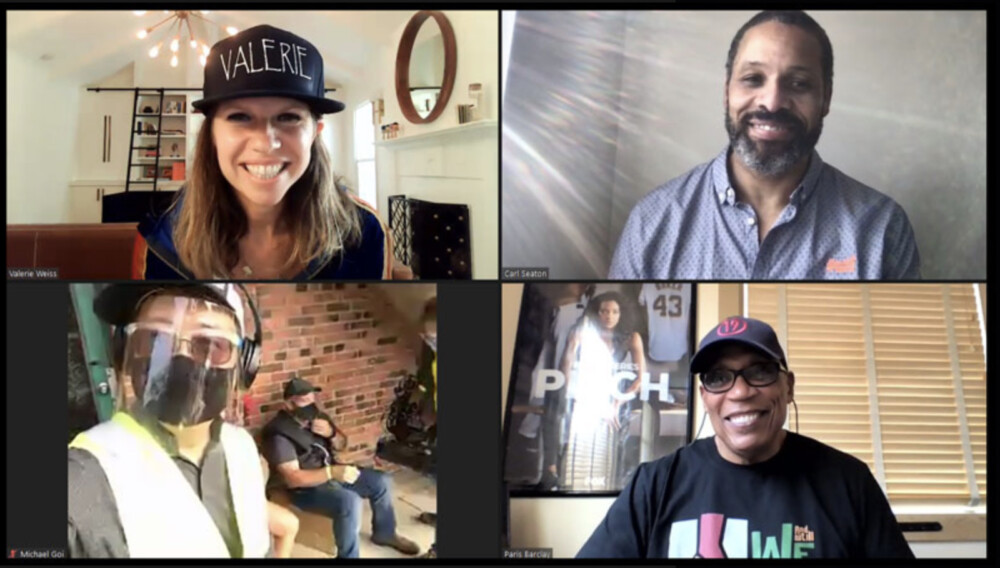by Cathy Hammer

You may have noticed many more options returning to your viewing line-up. While some shows were fortunate enough to have finished shooting before the film and television industry shut down on March 13, many others including Ryan Murphy’s highly anticipated The Prom on Netflix, resumed production under protocols described in “The Safe Way Forward.” This Multi-Union Report resulted from weeks of negotiations with producers and added considerable sums to budgets in order to cover essential PPE and testing. The guidelines adhere to known science and include mandatory regular testing, a Zone system which enforces special precautions in the area closest to unmasked actors to decrease their exposure risk, a designated COVID-19 compliance supervisor on each set who is responsible for safety compliance and enforcement, and — in an industry first — quarantine and sick leave pay.
I recently attended Directing in the Time of COVID: Lessons from the Frontlines of Hollywood’s Return to Production to gain a better understanding of how the new protocols are affecting productions and the teams who make the shows possible. The panelists included Directors Paris Barclay (Station 19), Michael Goi (The Rookie), and Valerie Weiss (Outer Banks). The generally upbeat conversation was moderated by Director Carl Seaton who Co-Chairs the Directors Guild of America Diversity Task Force along with Goi.
The program opened with a slide show prepared by Barclay, a two-term DGA past president and seasoned episodic television director. His heartfelt personal stories well-illustrated the increased importance of emotional intelligence in the post-COVID world. Though everyone is thrilled to be back doing the work they love, the long months of lockdowns with more looming have taken a toll. Sadly some crew members have lost loved ones. Barclay himself was treated for COVID in July. While he praised the infrastructure provided by “The Safe Way Forward” agreement which makes safety possible, he also stressed the importance for everyone to work together to make life on the set as easy as possible. Compliance is everyone’s responsibility, but it will take time even when everyone does their best. Certainly safety will never be achieved if it is viewed as solely a safety team issue.
A scientist as well as a director, Weiss used her time to focus on some of the tools that have helped her keep things flowing with minimal physical contact. She demonstrated the range of tasks that can be accomplished using Scriptation (https://scriptation.com), an app that was developed specifically to enable film and television production to go paperless. She also stressed the importance for all leaders to become versatile in Zoom, particularly the use of the white board for brainstorming sessions. She and Barclay then shared some of their favorite PPE from foam nose bridges that keep masks from fogging up eyewear to extender straps for those with wider faces. Weiss also modeled a cap with her name on it that makes it easy to identify her even when much of her face is concealed.
Goi Zoomed in from his set, his voice slightly muffled by his face shield. All schedules have minimized rehearsal time to decrease everyone’s exposure. This requires that a director’s preparation be maximized and Goi likes to have his shot sheets laid out in detail. In particular, Goi discussed the challenge of being able to evaluate an actor’s rehearsal — during which performers stay masked — in order to adjust his direction and get the best take on camera.
Everyone in the industry misses the intimacy that can only be achieved with face time. In a recent Hollywood Reporter article about the enforcement of the new guidelines, dreams of the future included “… the return of the big communal bucket of Red Vines” (Scott M. Gimple The Walking Dead series) and “[the freedom to] sneeze and people don’t look at me like I betrayed them” (Mindy Kaling, Never Have I Ever). Barclay said he missed springing for late night pizza to reward his crew after a particularly hard day. However, all the panelists mentioned surprise benefits to the new state of affairs. Production days have been shortened and dinners with the family have become more regular. There is less paperwork and consequently less paper being used. And self-care is front and center resulting in fewer sniffles and coughs which often plague sets during the change of seasons. Most importantly, these talented artists are still making great work and keeping the rest of us highly entertained.
*Photo from top left: Valerie Weiss, Carl Seaton, Paris Barclay and Michael Goi; courtesy of the Directors Guild of America Diversity Task Force.

















